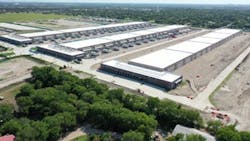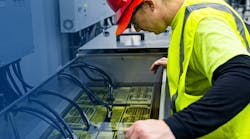How U.S. Manufacturing Is Rising To Meet Booming Data Center Industry Demand
Last week at its Capital Markets Day meeting with investors, Schneider Electric announced a $3 billion multi-year technology agreement with Compass Datacenters, in an expansion of an existing partnership to manufacture and deliver prefabricated modular data centers.
In large part due to the burgeoning AI market, the partners contend that the skyrocketing generation and consumption of data requires a new breed of data center that can be standardized in its design and more efficiently manufactured.
"We are extremely grateful for the unwavering support and unparalleled expertise that Schneider Electric has already provided in supplying us with pre-fabricated data center power rooms," said Chris Crosby, CEO, Compass Datacenters.
The partners say their integration of supply chains stands to deliver finished goods more quickly, with more predictability, and at a lower cost.
Under terms of a 5-year vendor-supplier agreement, Schneider Electric and Compass Datacenters have been delivering on their shared promise of furnishing scalable, modular data centers with a simplified design, streamlined manufacturing, and the ability to be deployed easily across diverse environments.
"Our collaborative efforts will allow us to meet the increasing demands from our customers to deliver cutting-edge data center solutions in an innovative manner," added Crosby.
Since the initial inception of the agreement between the companies, Schneider Electric, a specialist in the digital transformation of energy management and automation, has manufactured and delivered about 150 modular data center solutions to Compass from its West Chester, Ohio operation.
As demand for more data center capacity increases, an associated 110,000 square-foot Red Oak, Texas operation, as jointly announced by the partners this summer, will also be used to support projected growth.
"We are proud that Compass chose Schneider Electric as their data center partner because we can provide the infrastructure they require in a predictable and reliable manner," said Aamir Paul, President, Schneider Electric North America.
Paul added, "The extension of our agreement to continue innovating will address future demands to serve customers in industries ranging from cloud and service providers to semiconductors and EV's, healthcare and telecommunication, among others."
Recent findings by McKinsey as cited by Schneider Electric and Compass indicate that companies that regularly collaborated with suppliers demonstrated higher growth, lower operating costs, and greater profitability than their industry peers.
However, despite such improved efficiencies, the McKinsey data also indicated that many businesses struggled to integrate the approach into their overall procurement and supply-chain strategies, demonstrating the growing need for such new partnership models.
A Gathering Trend
Data center infrastructure suppliers locating key U.S. manufacturing facilities in conventient proximity to key U.S. data center markets has been a gathering trend.
In October, Schneider Electric announced a separate partnership with JLL and Lumen to speed delivery of modular data centers across U.S.
In this collaboration, JLL will quickly identify and secure suitable sites for modular data centers, including approximately 5,000 along Lumen’s fiber broadband network.
A specialist in the digital transformation of energy management and automation platforms, Schneider Electric is heading up the collaborative initiative's design and construction teams.
Meanwhile, earlier this month, Germany-based Siemens AG announced a ramping of investment in U.S. electrical infrastructure ahead of the oncoming generative AI data center surge.
Siemens is investing $150 million in a new manufacturing plant in the Dallas-Fort Worth market to help power U.S. data centers, while boosting uptake of AI computing workloads.
Earlier this year, the company announced a related $220 million investment in a new rail manufacturing facility in Lexington, North Carolina, construction of which is now underway.
Additionally this year, Siemens is investing in two more electrical products manufacturing plants in Grand Prairie, Texas, and Pomona, California.
The manufacturer said the new Fort Worth facility and its Grand Prairie and Pomona extensions will meet booming demand for the electrification of critical infrastructure, including data centers, battery plants, semiconductor facilities, and EV charging equipment.
Taken together, all of the projects bring Siemens' overall U.S. investment in manufacturing for critical infrastructure to $510 million for 2023.
Finally this month, GE Vernova and Our Next Energy Inc. (ONE) were seen signing a term sheet to collaborate towards advancing battery energy storage solutions in the U.S. using locally manufactured batteries.
The collaboration covers the supply of ONE’s battery modules containing U.S.-manufactured lithium iron phosphate (LFP) cells for GE Vernova's Solar & Storage Solutions business projects across the country.
"Storage is the key to stabilizing the grid. In addition, it unlocks 100% renewable energy to power factories, communities, hospitals, and data centers," said Mujeeb Ijaz, founder and CEO at ONE.
With the integration of locally manufactured LFP batteries, GE Vernova and its customers will be able to take advantage of incentives offered by the Inflation Reduction Act (IRA) and Investment Tax Credits (ITC).
ONE's Ijaz added, "As demand increases for energy storage systems, we are honored to play a role in helping GE Vernova and its customers transition the U.S. to more sustainable power sources by providing them with domestically produced batteries and cells.”
As noted by the supplier, when paired with renewable energy generation, energy storage solutions play a pivotal role in helping to ensure uninterrupted access to power throughout the day by storing produced excess energy, and releasing it during periods of low generation or high demand.
Analysts at Bloomberg New Energy Finance as cited by GE Vernova expect the U.S. stationary energy storage market to grow at a rate of 11.4% through 2030.
Prakash Chandra, CEO at GE Vernova’s Solar & Storage Solutions business, commented, "Battery Energy Storage Systems (BESS) are vital for the renewable energy transition and grid stability. GE Vernova has deployed its FlexReservoir BESS systems globally. Now, in partnership with Our Next Energy, we're bringing American-made batteries to power local communities, bolstering manufacturing and job growth. This is a testament to the US's leadership, fostering job creation and energy self-sufficiency, and investments in the energy sector."
Keep pace with the fast-moving world of data centers and cloud computing by connecting with Data Center Frontier on LinkedIn, following us on X/Twitter and Facebook, and signing up for our weekly newsletters using the form below.
About the Author
Matt Vincent
A B2B technology journalist and editor with more than two decades of experience, Matt Vincent is Editor in Chief of Data Center Frontier.



